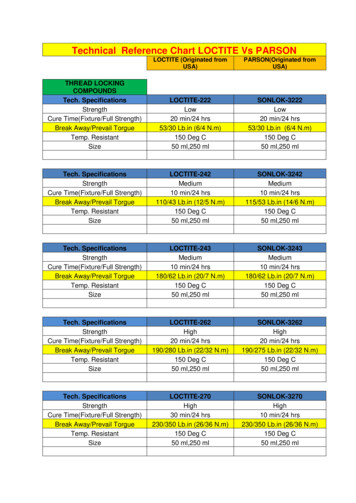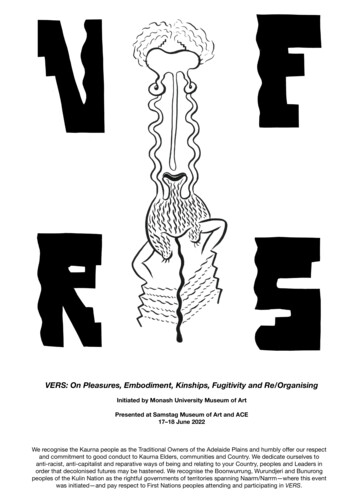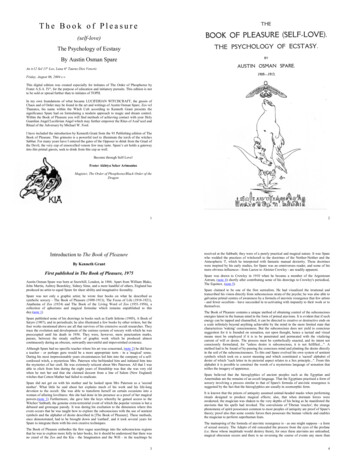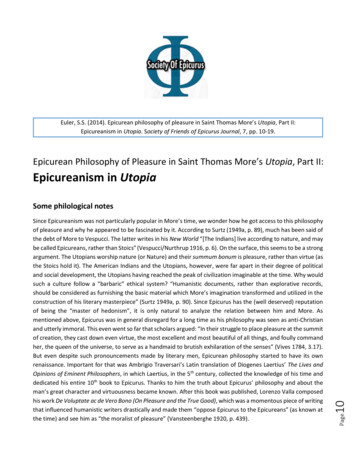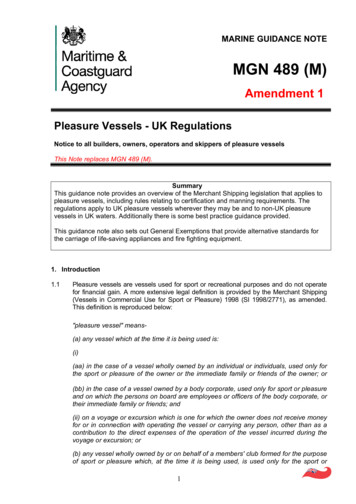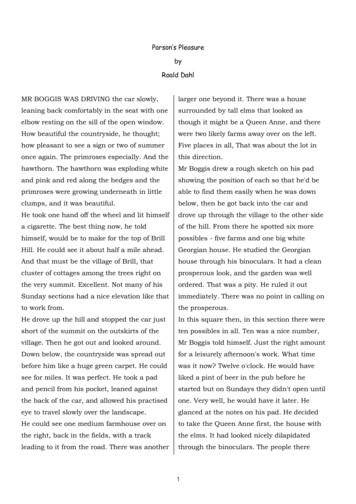
Transcription
Parson’s PleasurebyRoald DahlMR BOGGIS WAS DRIVING the car slowly,larger one beyond it. There was a houseleaning back comfortably in the seat with onesurrounded by tall elms that looked aselbow resting on the sill of the open window.though it might be a Queen Anne, and thereHow beautiful the countryside, he thought;were two likely farms away over on the left.how pleasant to see a sign or two of summerFive places in all, That was about the lot inonce again. The primroses especially. And thethis direction.hawthorn. The hawthorn was exploding whiteMr Boggis drew a rough sketch on his padand pink and red along the hedges and theshowing the position of each so that he'd beprimroses were growing underneath in littleable to find them easily when he was downclumps, and it was beautiful.below, then he got back into the car andHe took one hand off the wheel and lit himselfdrove up through the village to the other sidea cigarette. The best thing now, he toldof the hill. From there he spotted six morehimself, would be to make for the top of Brillpossibles - five farms and one big whiteHill. He could see it about half a mile ahead.Georgian house. He studied the GeorgianAnd that must be the village of Brill, thathouse through his binoculars. It had a cleancluster of cottages among the trees right onprosperous look, and the garden was wellthe very summit. Excellent. Not many of hisordered. That was a pity. He ruled it outSunday sections had a nice elevation like thatimmediately. There was no point in calling onto work from.the prosperous.He drove up the hill and stopped the car justIn this square then, in this section there wereshort of the summit on the outskirts of theten possibles in all. Ten was a nice number,village. Then he got out and looked around.Mr Boggis told himself. Just the right amountDown below, the countryside was spread outfor a leisurely afternoon's work. What timebefore him like a huge green carpet. He couldwas it now? Twelve o'clock. He would havesee for miles. It was perfect. He took a padliked a pint of beer in the pub before heand pencil from his pocket, leaned againststarted but on Sundays they didn't open untilthe back of the car, and allowed his practisedone. Very well, he would have it later. Heeye to travel slowly over the landscape.glanced at the notes on his pad. He decidedHe could see one medium farmhouse over onto take the Queen Anne first, the house withthe right, back in the fields, with a trackthe elms. It had looked nicely dilapidatedleading to it from the road. There was anotherthrough the binoculars. The people there1
could probably do with some money. He wasrecognise and reject an ungraceful design,always lucky with Queen Annes, anyway. Mrhowever genuine the article might be. His realBoggis climbed back into the car, released thelove, naturally, was for the work of the greathandbrake, and began cruising slowly downeighteenth-century English designers, Ince,the hill without the engine.Mayhew, Chippendale, Robert AdamsApart from the fact that he was at thisManwaring Inigo Jones, Hepplewhite, Kentmoment disguised in the uniform of aJohnson George Smith Lock Sheraton, andclergyman there was nothing very sinisterthe rest of them but even with these heabout Mr Cyril Boggis. By trade he was aoccasionally drew the line. He refused fordealer in antique furniture, with his ownexample, to allow a single piece fromshop and showroom in the King's Road,Chippendale's Chinese or Gothic period toChelsea. His premises were not large, andcome into his showroom and the same wasgenerally he didn't do a great deal oftrue of some of the heavier Italian designs ofbusiness, but because he always boughtRobert Adam.cheap, very very cheap, and sold very veryDuring the past few years, Mr Boggis haddear, he managed to make quite a tidy littleachieved considerable fame among his friendsincome every year. He was a talentedin the trade by his ability to produce unusualsalesman and when buying or selling a pieceand often quite rare items with astonishinghe could slide smoothly into whichever moodregularity. Apparently the man had a sourcesuited the client best. He could become graveof supply that was almost inexhaustible, aand charming for the aged obsequious for thesort of private warehouse, and it seemed thatrich, sober for the godly, masterful for theall he had to do was to drive out to it once aweak, mischievous for the widow, arch andweek and help himself. Whenever they askedsaucy for the spinster. He was well aware ofhim where he got the stuff, he would smilehis gift, using it shamelessly on everyknowingly and wink and murmur somethingpossible occasion; and often, at the end of anabout a little secret.unusually good performance, it was as muchThe idea behind Mr Boggis's little secret wasas he could do to prevent himself froma simple one, and it had come to him as aturning aside and taking a bow or two as theresult of something that had happened on athundering applause of the audience wentcertain Sunday afternoon nearly nine yearsrolling through the theatre.before, while he was driving in the country.In spite of this rather clownish quality of his,He had gone out in the morning to visit hisMr Boggis was not a fool. In fact it was said ofold mother, who lived in Sevenoaks, and onhim by some that he probably knew as muchthe way back the fan-belt on his car hadabout French, English and Italian furniturebroken, causing the engine to overheat andas anyone else in London. He also hadthe water to boil away. He had got out of thesurprisingly good taste, and he was quick tocar and walked to the nearest house, a2
smallish farm building about fifty yards offHow much?the road and had asked the woman whoThirty-five pounds.answered the door if he could please have aDear me, thirty-five pounds. Well, well, thatjug of water.was very interesting. She'd always thoughtWhile he was waiting for her to fetch it, hethey were valuable. They were very old. Theyhappened to glance in through the door to thewere very comfortable too. She couldn'tliving-room and there, not five yards frompossibly do without them, not possibly. No,where he was standing, he spotted somethingthey were not for sale but thank you verythat made him so excited the sweat began tomuch all the same.come out all over the top of his head. It was aThey weren't really so very old Mr Boggis toldlarge oak armchair of a type that he had onlyher, and they wouldn't be at all easy to sell,seen once before in his life. Each arm as wellbut it just happened that he had a client whoas the panel at the back, was supported by arather liked that sort of thing. Maybe herow of eight beautifully turned spindles. Thecould go up another two pounds - call itback panel itself was decorated by an inlay ofthirty-seven. How about that?the most delicate floral design, and the headThey bargained for half an hour, and ofof a duck was carved to lie along half thecourse in the end Mr Boggis got the chairslength of either arm. Good God he thought.and agreed to pay her something less than aThis thing is late fifteenth century!twentieth of their value.He poked his head in further through theThat evening, driving back to London in hisdoor, and there, by heavens, was another ofold station-wagon with the two fabulousthem on the other side of the fireplace!chairs tucked away snugly in the back MrHe couldn't be sure, but two chairs like thatBoggis had suddenly been struck by whatmust be worth at least a thousand pounds upseemed to him to be a most remarkable idea.in London. And oh, what beauties they were!‘Look here’, he said. ‘If there is good stuff inWhen the woman returned Mr Boggisone farmhouse, then why not in others?’ Whyintroduced himself and straight away asked ifshouldn't he search for it? Why shouldn't heshe would like to sell her chairs.comb the countryside? He could do it onDear me, she said. But why on earth shouldSundays. In that way, it wouldn't interfereshe want to sell her chairs?with his work at all. He never knew what toNo reason at all, except that he might bedo with his Sundays.willing to give her a pretty nice price.So Mr Boggis bought maps, large scale mapsAnd how much would he give? They wereof all the counties around London, and with adefinitely not for sale, but just out offine pen he divided each of them up into acuriosity, just for fun, you know, how muchseries of squares. Each of these squareswould he give?covered an actual area of five miles by five,Thirty-five pounds.which was about as much territory, he3
estimated as he could cope with on a singletravelling around on a labour of love for theSunday, were he to comb it thoroughly. He'Society', compiling an inventory of thedidn't want the towns and the villages. It wastreasures that lay hidden in the countrythe comparatively isolated places, the largehomes of England. And who in the world wasfarmhouses and the rather dilapidatedgoing to kick him out when they heard thatcountry mansions, that he was looking forone?and in this way, if he did one square eachNobody.Sunday, fifty-two squares a year, he wouldAnd then once he was inside, if he happenedgradually cover every farm and every countryto spot something he really wanted well - hehouse in the home counties.knew a hundred different ways of dealingBut obviously there was a bit more to it thanwith that.that. Country folk are a suspicious lot So areRather to Mr Boggis's surprise, the schemethe impoverished rich. You can't go aboutworked. In fact, the friendliness with whichringing their bells and expecting them tohe was received in one house after anothershow you around their houses just for thethrough the countryside was, in theasking, because they won't do it. That waybeginning, quite embarrassing, even to him. Ayou would never get beyond the front door.slice of cold pie, a glass of port, a cup of tea, aHow then was he to gain admittance?basket of plums, even a full sit-down SundayPerhaps it would be best if he didn't let themdinner with the family, such things wereknow he was a dealer at all. He could be theconstantly being pressed upon him. Soonertelephone man, the plumber, the gasor later, of course, there had been some badinspector. He could even be a clergyman.'moments and a number of unpleasantFrom this point on, the whole scheme beganincidents, but then nine years is more thanto take on a more practical aspect. Mr Boggisfour hundred Sundays, and that adds up to aordered a large quantity of superior cards ongreat quantity of houses visited All in all, itwhich the following legend was engraved:had been an interesting, exciting, andlucrative business.And now it was another Sunday andTHE REVERENDCYRIL WINNINGTON BOGGISMr Boggis was operating in the county ofBuckinghamshire, in one of the mostPresident of the Society for thenortherly squares on his map, about tenPreservation of Rare Furniture. Inmiles from Oxford and as he drove down theassociation with The Victoria andhill and headed for his first house, theAlbert Museum.dilapidated Queen Anne, he began to get thefeeling that this was going to be one of hisFrom now on, every Sunday, he was going tolucky days. He parked the car about abe a nice old parson spending his holidayhundred yards from the gates and got out to4
walk the rest of the way. He never likedMr Boggis explained about the Society for thepeople to see his car until after a deal wasPreservation of Rare Furniture.completed. A dear old clergyman and a large'This wouldn't by any chance be something tostation-wagon somehow never seemed quitedo with the Socialist Party?' she asked,right together. Also the short walk gave himstaring at him fiercely from under a pair oftime to examine the property closely from thepale bushy brows.outside and to assume the mood most likelyFrom then on, it was easy. A Tory in riding--to be suitable for the occasion. Mr Boggisbreeches, male or female, was always astrode briskly up the drive. He was a smallsitting duck for Mr Boggis. He spent twofatlegged man with a belly. The face wasminutes delivering an impassioned eulogy onround and rosy, quite perfect for the part,the extreme Right Wing of the Conservativeand the two large brown eyes that bulged outParty, then two more denouncing theat you from this rosy face gave an impressionSocialists. As a clincher, he made particularof gentle imbecility. He was dressed in a blackreference to the Bill that the Socialists hadsuit with the usual parson's dog-collar roundonce introduced for the abolition of blood-his neck and on his head a soft black hat. Hesports in the country, and went on to informcarried an old oak walking-stick which lenthis listener that his idea of heaven - thoughhim in his opinion a rather rustic easy-goingyou better not tell the bishop, my dear' - wasair.a place where one could hunt the fox, theHe approached the front door and rang thestag, and the hare with large packs of tirelessbell. He heard the sound of footsteps in thehounds from morn till night every day of thehall and the door opened and suddenly thereweek, including Sundays.stood before him or rather above him, aWatching her as he spoke, he could see thegigantic woman dressed in riding-breeches.magic beginning to do its work. The womanEven through the smoke of her cigarette hewas grinning now, showing Mr Boggis a set ofcould smell the powerful odour of stables andenormous, slightly yellow teeth. Madam,' hehorse manure that clung about her.cried I beg of you please don't get me started'Yes?' she asked looking at him suspiciously.on Socialism.' At that point, she let out a‘What is it you want?'great guffaw of laughter, raised an enormousMr Boggis, who half expected her to whinnyred hand, and slapped him so hard on theany moment, raised his hat made a little bow,shoulder that he nearly went over.and handed her his card.' I do apologise for'Come in!' she shouted I don't know what thebothering you,' he said and then he waitedhell you want but come on in!'watching her face as she read the message.Unfortunately, and rather surprisingly, there'I don't understand' she said handing backwas nothing of any value in the whole house,the card. What is it you want?'and Mr Boggis, who never wasted time onbarren territory, soon made his excuses and5
took his leave. The whole visit had taken lessthat peculiar outward splay that meant sothan fifteen minutes, and that, he toldmuch.himself as he climbed back into his car andIt was an exquisite chair. Before this day isstarted off for the next place, was exactly as itdone,' Mr Boggis said softly, I shall have theshould be. From now on it was allpleasure of sitting down upon that lovelyfarmhouses, and the nearest was about half aseat.' He never bought a chair without doingmile up the road. It was a large half-timberedthis. It was a favourite test of his, and it wasbrick building of considerable age, and therealways an intriguing sight to see him loweringwas a magnificent pear tree still in blossomhimself delicately into the seat, waiting forcovering almost the whole of the south wall.the 'give', expertly gauging the precise butMr Boggis knocked on the door. He waited,infinitesimal degree of shrinkage that thebut no one came. He knocked again, but stillyears had caused in the mortise and dovetailthere was no answer, so he wandered aroundjoints.the back to look for the farmer among theBut there was no hurry, he told himself. Hecowsheds. There was no one there either. Hewould return here later. He had the wholeguessed that they must all still be in church,afternoon before him.so he began peering in the windows to see ifThe next farm was situated some way back inhe could spot anything interesting. There wasthe fields, and in order to keep his car out ofnothing in the dining-room. Nothing in thesight Mr Boggis had to leave it on the roadlibrary either. He tried the next window, theand walk about six hundred yards along aliving-room, and there, right under his nose,straight track that led directly into the backin the little alcove that the window made, heyard of the farmhouse. This place, he noticedsaw a beautiful thing, a semicircular card--as he approached, was a good deal smallertable in mahogany, richly veneered, and inthan the last, and he didn't hold out muchthe style of Hepplewhite, built around 1780.hope for it. It looked rambling and dirty, and'Ah-ha,' he said aloud, pressing his face hardsome of the sheds were clearly in bad repair.against glass. 'Well done, Boggis.'There were three men standing in a closeBut that was not all. There was a chair theregroup in a corner of the yard, and one ofas well, a single chair, and if he were notthem had two large black greyhounds withmistaken it was of an even finer quality thanhim on leashes. When the men caught sightthe table. Another Hepplewhite, wasn't it?of Mr Boggis walking forward in his black suitAnd oh, what a beauty! The lattices on theand parson's collar, they stopped talking andback were finely carved with the honeysuckle,seemed suddenly to stiffen and freeze,the husk, and the paterae, the caning on thebecoming absolutely still, motionless, threeseat was original, the legs were veryfaces turned towards him, watching himgracefully turned and the two back ones hadsuspiciously as he approached.6
The oldest of the three was a stumpy mancurl to the mouth and a sneer around thewith a wide frog mouth and small shifty eyes,nose.and although Mr Boggis didn't know it his'Might I inquire if you are the owner?' Mrname was Rummins and he was the owner ofBoggis asked undaunted, addressing himselfthe farm.to Rummins.The tall youth beside him who appeared to'What is it you want?'have something wrong with one eye, was'I do apologise for troubling you, especially onBert; the son of Rummins.a Sunday.'The shortish flat-faced man with a narrowMr Boggis offered his card and Rummins tookcorrugated brow and immensely broadit and held it up close to his face. The othershoulders was Claud. Claud had dropped intwo didn't move, but their eyes swivelled overon Rummins in the hope of getting a piece ofto one side, trying to see.pork or ham out of him from the pig that had'And what exactly might you be wanting?'been killed the day before. Claud knew aboutRummins asked.the killing - the noise of it had carried farFor the second time that morning, Mr Boggisacross the fields - and he also knew that aexplained at some length the aims and idealsman should have a government permit to doof the Society for the Preservation of Rarethat sort of thing, and that Rummins didn'tFurniture.have one.'We don't have any,' Rummins told him when'Good afternoon,' Mr Boggis said. Isn't it ait was over. 'You're wasting your time.'lovely day? 'None of the three men moved. At'Now, just a minute, sir,' Mr Boggis saidthat moment they were all thinking preciselyraising a finger. The last man who said thatthe same thing - that somehow or other thisto me was an old farmer down in Sussex, andclergyman who was certainly not the localwhen he finally let me into his house, d'youfellow, had been sent to poke his nose intoknow what I found? A dirty-looking old chairtheir business and to report what he found toin the corner of the kitchen, and it turned outthe government.to be worth FOUR HUNDRED POUNDS! I'What beautiful dogs,' Mr Boggis said. I mustshowed him how to sell it, and he boughtsay I've never been greyhound-racing myself,himself a new tractor with the money.'but they tell me it's a fascinating sport.''What on earth are you talking about?' ClaudAgain the silence, and Mr Boggis glancedsaid. There ain't no chair in the world worthquickly from Rummins to Bert, then to Claudfour hundred pound.'then back again to Rummins, and he noticed'Excuse me,' Mr Boggis answered primly, that each of them had the same peculiarbut there are plenty of chairs in Englandexpression on his face, something between aworth more than twice that figure. And youjeer and a challenge, with a contemptuousknow where they are? They're tucked away inthe farms and cottages all over the country,7
with the owners using them as steps andlittle shrill gasp of shock. Then he stood thereladders and standing on them with hobnailedfor five, ten fifteen seconds at least, staringboots to reach a pot of jam out of the toplike an idiot, unable to believe, not daring tocupboard or to hang a picture. This is thebelieve what he saw before him. It couldn't betruth I'm telling you, my friends.'true, not possibly! But the longer he stared,Rummins shifted uneasily on his feet.the more true it began to seem. After all, You mean to say all you want to do is gothere it was standing against the wall right ininside and stand there in the middle of thefront of him, as real and as solid as the houseroom and look around?'itself. And who in the world could possibly'Exactly,' Mr Boggis said. He was at lastmake a mistake about a thing like that?beginning to sense what the trouble might be.Admittedly it was painted white, but that I don't want to pry into your cupboards ormade not the slightest difference. Some idiotinto your larder. I just want to look at thehad done that The paint could easily befurniture to see if you happen to have anystripped off. But good God! Just look at it!treasures here, and then I can write aboutAnd in a place like this!them in our Society magazine.'At this point Mr Boggis became aware of the'You know what I think?' Rummins said,three men, Rummins, Bert and Claudfixing him with his small wicked eyes. I thinkstanding together in a group over by theyou're after buying the stuff yourself. Whyfireplace, watching him intently. They hadelse would you be going to all this trouble?'seen him stop and gasp and stare, and they'Oh, dear me. I only wish I had the money. Ofmust have seen his face turning red or maybecourse, if I saw something that I took a greatit was white, but in any event they had seenfancy to, and it wasn't beyond my means, Ienough to spoil the whole goddamn businessmight be tempted to make an offer. But alas,if he didn't do something about it quick. In athat rarely happens.'flash, Mr Boggis clapped one hand over his'Well,' Rummins said I don't suppose there'sheart, staggered to the nearest chair, andany harm in your taking a look around ifcollapsed into it breathing heavily.that's all you want.' He led the way across the'What's the matter with you?' Claud askedyard to the back door of the farmhouse, and'It's nothing,' he gasped. ‘I'll be all right in aMr Boggis followed him; so did the son Bert,minute. Please - a glass of water. It's myand Claud with his two dogs. They wentheart'through the kitchen where the only furnitureBert fetched him the water, handed it to himwas a cheap deal table with a dead chickenand stayed close beside him staring down atlying on it, and they emerged into a fairlyhim with a fatuous leer on his face.large, exceedingly filthy living-room.'I thought maybe you were looking atAnd there it was! Mr Boggis saw it at once,something,' Rummins said. The wideand he stopped dead in his tracks and gave afrog-mouth widened a fraction further into a8
crafty grin, showing the stubs of severalhouse at Moreton-in-Marsh, and was sold atbroken teeth.Sotheby's the same year; that the other two'No, no,' Mr Boggis said. Oh dear me, no. It'sturned up in the same auction rooms a yearjust my heart. I'm so sorry. It happens everylater, both coming out of Raynham Hall,now and then. But it goes away quite quickly.Norfolk. They all fetched enormous prices. HeI'll be all right in a couple of minutes.'couldn't quite remember the exact figure forHe must have time to think, he told himself.the first one, or even the second, but he knewMore important still, he must have time tofor certain that the last one to be sold hadcompose himself thoroughly before he saidfetched thirty-nine hundred guineas. Andanother word. Take it gently, Boggis. Andthat was in 1921! Today the same piecewhatever you do, keep calm. These peoplewould surely be worth ten thousand pounds.may be ignorant, but they are not stupid.Some man, Mr Boggis couldn't remember hisThey are suspicious and wary and sly. And ifname, had made a study of these commodesit is really true - no it couldn't be, it can't befairly recently and had proved that all threetrue.must have come from the same workshop, forHe was holding one hand up over his eyes inthe veneers were all from the same log, anda gesture of pain, and now, very carefully,the same set of templates had been used insecretly, he made a little crack between two ofthe construction of each. No invoices hadthe fingers and peeked through.been found for any of them but all the expertsSure enough, the thing was still there, and onwere agreed that these three commodes couldthis occasion he took a good long look at it.have been executed only by Thomas Chip-Yes - he had been right the first time! Therependale himself, with his own hands, at thewasn't the slightest doubt about it! It wasmost exalted period in his career.really unbelievable! What he saw was a pieceAnd here, Mr Boggis kept telling himself as heof furniture that any expert would have givenpeered cautiously through the crack in hisalmost anything to acquire. To a layman, itfingers, here was the fourth Chippendalemight not have appeared particularlyCommode! And he had found it! He would beimpressive, especially when covered over as itrich! He would also be famous! Each of thewas with dirty white paint but to Mr Boggis itother three was known throughout thewas a dealer's dream. He knew, as does everyfurniture world by a special name - Theother dealer in Europe and America, thatChastleton Commode, The First Raynhamamong the most celebrated and coveted ex-Commode, The Second Raynham Commode.amples of eighteenth-century EnglishThis one would go down in history as Thefurniture in existence are the three famousBoggis Commode! Just imagine the faces ofpieces known as The Chippendalethe boys up there in London when they got aCommodes'. He knew their history backwardslook at it tomorrow morning! And the- that the first was discovered' in 1920, in aluscious offers coming in from the big fellows9
over in the West End - Frank Partridge,yes,' he said, raising himself slowly to hisMallett, Jetley, and the rest of them! Therefeet. That's better. I'm all right now.'would be a picture of it in The Times, and itA trifle unsteadily, he began to move aroundwould say, 'The very fine Chippendalethe room examining the furniture, one pieceCommode which was recently discovered byat a time, commenting upon it briefly. HeMr Cyril Boggis, a London dealer. . . .' Dearcould see at once that apart from theGod, what a stir he was going to make!commode it was a very poor lot.This one here Mr Boggis thought, was almost'Nice oak table,' he said. But I'm afraid it'sexactly similar to the Second Raynhamnot old enough to be of any interest. GoodCommode. (All three the Chastleton and thecomfortable chairs, but quite modern, yes,two Raynhams, differed from one another in aquite modern. Now this cupboard, well, it'snumber of small ways.) It was a mostrather attractive, but again, not valuable.impressive handsome affair, built in theThis chest-of-drawers' - he walked casuallyFrench rococo style of Chippendale'spast the Chippendale Commode and gave it aDirectoire period, a kind of large fatlittle contemptuous flip with his fingers -chest-of-drawers set upon four carved and worth a few pounds, I dare say, but no more.fluted legs that raised it about a foot from theA rather crude reproduction, I'm afraid.ground. There were six drawers in all, twoProbably made in Victorian times. Did youlong ones in the middle and two shorter onespaint it white?'on either side. The serpentine front was'Yes,' Rummins said, Bert did it.'magnificently ornamented along the top and'A very wise move. It's considerably lesssides and bottom, and also vertically betweenoffensive in white.'each set of drawers, with intricate carvings of'That's a strong piece of furniture,' Rumminsfestoons and scrolls and clusters. The brasssaid. Some nice carving on it too.'handles, although partly obscured by white'Machine-carved' Mr Boggis answeredpaint, appeared to be superb. It was, ofsuperbly, bending down to examine thecourse, a rather heavy' piece, but the designexquisite craftsmanship. You can tell it ahad been executed with such elegance andmile off. But still, I suppose it's quite pretty ingrace that the heaviness was in no wayits way. It has its points.'offensive.He began to saunter off, then he checked'How're you feeling now?' Mr Boggis heardhimself and turned slowly back again. Hesomeone saying.placed the tip of one finger against the point'Thank you, thank you, I'm much betterof his chin, laid his head over to one side, andalready. It passes quickly. My doctor says it'sfrowned as though deep in thought.nothing to worry about really so long as I rest'You know what?' he said, looking at thefor a few minutes whenever it happens. Ahcommode, speaking so casually that his voicekept trailing off. I've just remembered', I've10
been wanting a set of legs something like that'I'm not so sure about that,' Rummins toldfor a long time. I've got a rather curious tablehim. It's been in here over twenty years, andin my own little home, one of those low thingsbefore that it was up at the Manor House. Ithat people put in front of the sofa, sort of abought it there myself at auction when thecoffee-table, and last Michaelmas, when Iold Squire died. You can't tell me that thing'smoved house, the foolish movers damagednew.'the legs in the most shocking way. I'm very'It's not exactly new, but it's certainly notfond of that table. I always keep my big Biblemore than about sixty years old.'on it, and all my sermon notes.''It's more than that,' Rummins said. Bert,He paused, stroking his chin with the finger.where's that bit of paper you once found at Now I was just thinking. These legs on yourthe back of one of them drawers? That oldchest-of-drawers might be very suitable. Yes,bill.'they might indeed. T
Parson's Pleasure by Roald Dahl MR BOGGIS WAS DRIVING the car slowly, leaning back comfortably in the seat with one elbow resting on the sill of the open window. How beautiful the countryside, he thought; how pleasant to see a sign or two of summer once again. The primroses especially. And the hawthorn. The hawthorn was exploding white
